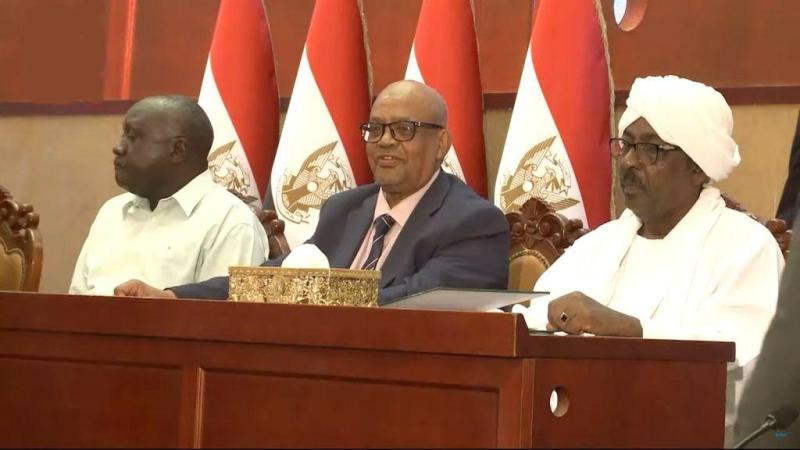Questions swirling around Sudan’s PCP signature of framework agreement
December 10, 2022 (KHARTOUM) – Ever since the signing of the framework agreement in Sudan last week, observers have questioned whether the Islamic-leaning Popular Congress Party (PCP) managed to strike a secret with the military by which they would be a signatory in return for some concessions.
PCP divisions:
Immediately after the PCP signed the framework agreement, a statement was issued bearing by the “Committee delegated to implement the decisions of the Shura Council,” stating:
“The Shura Council of the PCP declares its innocence from signing the framework agreement, and whoever signs it represents only himself. Our party is rooted in religion, so there is no room for exclusivity by opinion”.
“Since the PCP is an entity based on religion, and realizing that Shura is a value of religion and a binding procedure that entails binding application by the group, it was prevented from convening on Saturday, December 3rd 2022 by an individual decision of the imprisoned Secretary-General so that the framework agreement can be signed without a decision from the stalled Shura Council” the statement reads.
Ammar al-Sajjad, a PCP figure who is also at odds with Secretary General Ali al-Haj claimed that the latter came to an agreement with General Abdel-Fatah al-Burhan.
“It has leaked out to us that PCP will reap the release of its leaders from prison, headed by al-Haj after signing the agreement,” he said.
Al-Sajjad slammed PCP for joining the framework agreement saying it was forced on the party by al-Haj without consulting party bodies and despite him being in prison. He described what happened as “deception”.
Al-Haj along with the chairman of the PCP Shura (consultative) Council Ibrahim Alanosi and one of the party’s leading figures Omer Abdel-Maarouf were arrested in connection with the 1989 military coup that brought President Omar al-Bashir to power in a plot orchestrated by the founder of National Islamic Front (NIF) and the PCP successor organization Hassan Al-Turabi.
The PCP reconciled with Bashir’s regime after 15 years in opposition ranks and joined his government up until its downfall in April 2019.
‘No secret deal’:
But the PCP Political Secretary Kamal Omer described these reports as “puzzling” noting that the party stood firmly against the October 25th coup and is considered one of the parties that thwarted it. As such, it is not conceivable for the PCP to enter into a “political process” with the army chief.
Omer told Sudan Tribune “The signatories to the framework agreement are working to form a civilian government that will remove the army from power, draft the constitution and revive the political process. Therefore, this talk is not consistent with the basic intellectual premises of the PCP”.
Omer said that these reports are intended to weaken the participation of the PCP in the political consensus and sabotage it even though its philosophy is clear and centred around democracy, freedoms and civilian authority.
“We will continue working with political forces to implement transitional constitution draft, political declaration and framework agreement to achieve civilian authority and impartial institutions for issues of peace and transitional justice, and we are proceeding to establish a new constitution” he added.
PCP spokesman Awad Falastini, told Sudan Tribune “There is no deal between us and the military for the release of three of our detained leaders. There is also an official organizational position that the trial they are subjected to should proceed till it is concluded and their case is decided; a verdict of innocence or conviction, but we will not accept their release through a pardon or clemency from any party. This is a position that undercuts these accusations”.
Burhan position:
Well-placed sources told Sudan Tribune that Burhan was unhappy with the amendments introduced by the PCP to the draft constitution of the Lawyers’ Committee, especially since al-Haj insisted on the need to liquidate the economic institutions of the army and return them under the jurisdiction of the Ministry of Finance.
PCP spokesperson confirmed this saying “We have made amendments to the constitutional document, and we hope that we will reach a consensus with everyone on a constitution that is satisfactory to all. We have called for the army to leave politics and the economy. The army cannot work in the economy. It must be confined to security and military system that preserves the country’s borders and the security of its people.”
{Sudan Tribune} reviewed the amendments proposed by the PCP to the draft in Article 34, Paragraph 2/B, which stipulates: “Completing security arrangements, and conducting mergers and demobilization operations to reach a single national army.” PCP added the phrase: “before the middle of the period.” transition” in order to set and specify the time span required for that process.
‘Criminal case’:
Al-Moez Hadra who is part of the legal team pressing a case against PCP leaders told {Sudan Tribune} that these figures are not charged in a political case, but a criminal one related to undermining the constitutional order on June 301989. He also added that they cannot be released on bail because the penalty for that crime is death or life imprisonment.
Hadra emphasized that the criminal case has nothing to do with the political settlement underway.
‘Normal divisions’:
Ahmed Al-Bahi, a political analyst, said that following the downfall of the Bashir regime the positions of the PCP remained divided among its ranks leading to the creation of interparty groups with different views.
He went on to say that like all other parties, PCP is seeking to achieve its own goals and priorities but that there are no conclusive answers on a secret deal between PCP and the military.
(ST)

